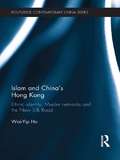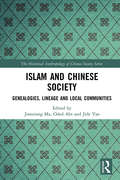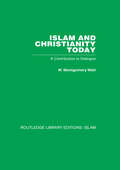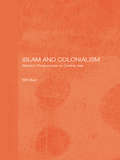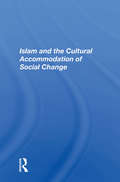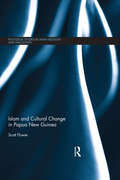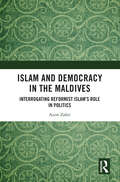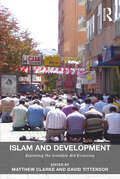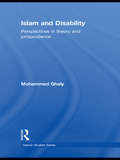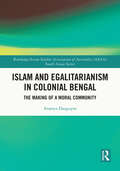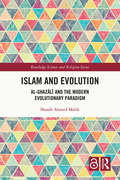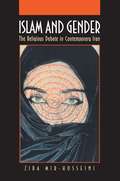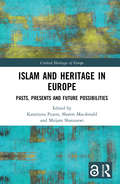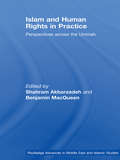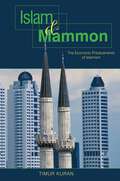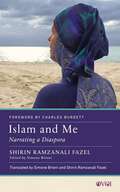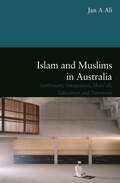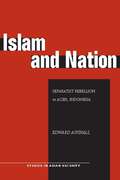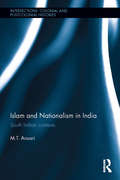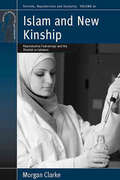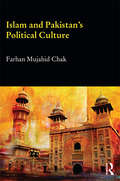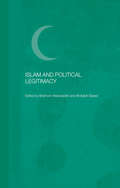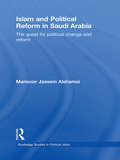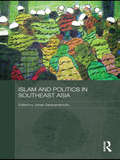- Table View
- List View
Islam and China's Hong Kong: Ethnic Identity, Muslim Networks and the New Silk Road (Routledge Contemporary China Series)
by Wai-Yip HoHong Kong is a global city-state under the sovereignty of the People’s Republic of China, and is home to around 250,000 Muslims practicing Islam. However existing studies of the Muslim-majority communities in Asia and the Northwest China largely ignore the Muslim community in Hong Kong. Islam and China’s Hong Kong skillfully fills this gap, and investigates how ethnic and Chinese-speaking Muslims negotiate their identities and the increasing public attention to Islam in Hong Kong. Examining a range of issues and challenges facing Muslims in Hong Kong, this book focuses on the three different diasporic Muslim communities and reveals the city-state’s triple Islamic heritage and distinctive Islamic culture. It begins with the transition from the colonial to the post-colonial era, and explores how this has impacted on the experiences of the Muslim diaspora, and the ways this shift has compelled the community to adapt to Chinese nationalism whilst forging greater links with the Gulf. Then with reference to the rise of new media and technology, the book examines the heightened presence of Islam in the Chinese public sphere, alongside the emergence of Chinese Islamic websites which have sought to balance transnational Muslim solidarity and sensitivity towards Chinese government’s concern of external extremism. Finally, it concludes by investigating Hong Kong’s growing awareness of the Muslim minorities’ demands for Islamic religious education, and how this links with the city-state’s aspiration to become the new gateway for Islamic finance. Indeed, Wai Yip Ho posits that Hong Kong is now shifting from its role as the broker that bridged East and West during the Cold War, to that of a new meditator between China and the Middle East. Drawing on extensive ethnographic research, this book thoughtfully charts a new area of inquiry, and as such will be welcomed by students and scholars of Chinese studies, Islamic studies, Asian studies and ethnicity studies.
Islam and Chinese Society: Genealogies, Lineage and Local Communities (The Historical Anthropology of Chinese Society Series)
by Jianxiong MaThis book explores the long history in China of Chinese Muslims, known as the Hui people, and regarded as a minority, though in fact they are distinguished by religion rather than ethnicity. It shows how over time Chinese Muslims adopted Chinese practices as these evolved in wider Chinese society, practices such as constructing and recording patrilinear lineages, spreading genealogies, and propagating education and Confucian teaching, in the case of the Hui through the use of Chinese texts in the teaching of Islam at mosques. The book also examines much else, including the system of certification of mosques, the development of Sufi orders, the cultural adaptation of Islam at the local level, and relations between Islam and Confucianism, between the state and local communities, and between the educated Muslim elite and the Confucian literati. Overall, the book shows how extensively Chinese Muslims have been deeply integrated within a multi-cultural Chinese society.
Islam and Christianity Today: A Contribution to Dialogue
by W M WattIn this volume, originally published in 1983, W Montgomery Watt looks at the meeting of Christianity and Islam, how they see and have seen each other, and considers how they can aid each other in dealing with the problems of the world today. He emphasizes those beliefs which Christianity and Islam have in common, and shows how they may be justified intellectually.
Islam and Colonialism: Western Perspectives on Soviet Asia (Central Asia Research Forum)
by Will MyerTracing the development of western thought about Central Asia, this book argues that for historical and political reasons, Central Asia was seen as being in a colonial relationship with Russia. Consequently, an anti-colonial revolution in Asia was seen as the greatest threat to the USSR. The book questions the suitability of the colonial model for understanding the region's recent political history and challenges many of the assumptions which underlay the adoption of such a model, and examines how this one interpretation came to dominate western discourse to the virtual exclusion of all others.
Islam And The Cultural Accommodation Of Social Change
by Bassam TibiTaking the perspective of anthropologist Clifford Geertz, Tibi re-approaches the problem of social change in Islam, arguing that religions represent cultural systems that both influence and are influenced by religion.
Islam and Cultural Change in Papua New Guinea
by Scott FlowerScholars of religion and policy makers may be surprised at the changes occurring on the second largest island of the world that straddles one of the most Christianised and least Christianised areas of the world. This book provides an accurate and deeper understanding of the nature of Islam in Papua New Guinea, and determines the causes and processes of recent growth in the country’s Muslim population. Combining ethnographic, sociological and historical approaches to understanding Islam’s growth in Papua New Guinea, the book uses extensive fieldwork, interviews and archival records to look at the establishment, institutionalization and growth of Islam in a country that is predominantly Christian. It analyses the causes and processes of conversion, and presents a new analytical approach that could be used as a basis for analysing Islamic conversions in other parts of the world. Presenting an interdisciplinary approach to the study of Islamic conversion thorough the examination of the causes and process of Islamic conversion in Papua New Guinea, the book is of interest to students and scholars of Asian Religion, Islamic Studies and Cultural Studies.
Islam and Cultural Change in Papua New Guinea (Routledge Studies in Asian Religion and Philosophy)
by Scott FlowerScholars of religion and policy makers may be surprised at the changes occurring on the second largest island of the world that straddles one of the most Christianised and least Christianised areas of the world. This book provides an accurate and deeper understanding of the nature of Islam in Papua New Guinea, and determines the causes and processes of recent growth in the country’s Muslim population. Combining ethnographic, sociological and historical approaches to understanding Islam’s growth in Papua New Guinea, the book uses extensive fieldwork, interviews and archival records to look at the establishment, institutionalization and growth of Islam in a country that is predominantly Christian. It analyses the causes and processes of conversion, and presents a new analytical approach that could be used as a basis for analysing Islamic conversions in other parts of the world. Presenting an interdisciplinary approach to the study of Islamic conversion thorough the examination of the causes and process of Islamic conversion in Papua New Guinea, the book is of interest to students and scholars of Asian Religion, Islamic Studies and Cultural Studies.
Islam and Democracy in the Maldives: Interrogating Reformist Islam’s Role in Politics (Routledge Studies in South Asian Politics)
by Azim ZahirThis book examines Islam’s relationship to democratization in the Indian Ocean nation of the Maldives. It explores how and why an electoral democracy based in a constitution that has many liberal features but also Islam-based limitations, especially lack of religious freedom, emerged in the country by 2009. In doing so, the book interrogates a major approach to Muslim politics that assumes reformist interpretations of Islam are a positive, and even a necessary, force for liberalization and democratization in Muslim-majority contexts. This book shows reformist Islam did play certain positive roles in democratization in the Maldives. However, the book suggests reformist Islam may not be an invariably uncontroversial force in the space of politics. It argues that modern nation building in the Maldives shaped by political actors with reformist Islamic orientations, since around the 1930s, has also completely transformed Islam as a modern institutional and discursive political religion. These transformations of Islam as a modern political religion have existed as path-dependent constraints on the depth of democratization, ensuring religion-based limitations and intensifying controversy over religion vis-à-vis the state and individual rights. An original empirical contribution towards a better understanding of Islam and politics in the Maldives, this book will be of interest to academics and students working on democracy, and Islam in particular, and in the fields of political science and area studies, especially South Asian politics.
Islam and Development: Exploring the Invisible Aid Economy
by Matthew Clarke David TittensorThe study of Islam since the advent of 9/11 has made a significant resurgence. However, much of the work produced since then has tended to focus on the movements that not only provide aid to their fellow Muslims, but also have political and at times violent agendas. This tendency has led to a dearth of research on the wider Muslim aid and development scene. Focusing on the role and impact of Islam and Islamic Faith Based Organisations (FBOs), an arena that has come to be regarded by some as the 'invisible aid economy', Islam and Development considers Islamic theology and its application to development and how Islamic teaching is actualized in case studies of Muslim FBOs. It brings together contributions from the disciplines of theology, sociology, politics and economics, aiming both to raise awareness and to function as a corrective step within the development studies literature.
Islam and Disability: Perspectives in Theology and Jurisprudence (Routledge Islamic Studies Series)
by Mohammed GhalyThis book explores the position of Islamic theology and jurisprudence towards people with disabilities. It investigates how early and modern Muslim scholars tried to reconcile their existence with the concept of a merciful God, and also looks at how people with disabilities might live a dignified and productive life within an Islamic context. In his analysis of Islamic Theology, Ghaly pays attention to how theologians, philosophers and Sufis reflected on the purposes behind the existence of this phenomenon, and how to reconcile the existence of disability with specific divine attributes and an All-Merciful God. Simultaneously exploring the perspective of Muslim jurists, the book focuses on how people with disabilities can lead a dignified life in the financial and non-financial sense, in an extensive analysis of topics such as the human dignity of people with disabilities and the role of Greek physiognomy, their employability, medical treatment, social life with main focus on marriage-related issues, financial life and means of living. Investigating the topic of disability from early and modern Islamic perspectives, the author provides an analysis of Muslim discussions on various bioethical questions. As such, this book will be of great relevance to current heated debates on human rights of people with disabilities, as well as providing a valuable resource for courses on Multicultural bioethics, Islamic theology, Islamic law and medical anthropology.
Islam and Egalitarianism in Colonial Bengal: The Making of a Moral Community (Routledge / Asian Studies Association of Australia (ASAA) South Asian Series)
by Ananya DasguptaThis book is a historical exploration of the social and cultural processes that led to the rise of the ideology of labor as a touchstone of Bengali Muslim politics in late colonial India. The book argues that the tremendous popularity of the Pakistan movement in Bengal is to be understood not just in terms of "communalization" of class politics, or even "separatist" demands of a religious minority living out anxieties of Hindu political majoritarianism, but in terms of a distinctively modern idea of Muslim self and culture which gave primacy to production/labor as the site where religious, moral, ethical as well as economic value would be anchored. In telling the story of the formation of a modern Muslim identity, the book presents the conceptual congruence between Islam and egalitarianism as a distinctively early twentieth century phenomenon, and the approach can be viewed as key to explaining the mass appeal of the desire for Pakistan. A novel contribution to the study of Bengal and Pakistan’s origins, the book will be of interest to researchers studying South Asian history, the history of colonialism and end of empire, South Asian studies, including labour studies, Islamic Studies, and Muslim social and cultural history.
Islam and Evolution: Al-Ghazālī and the Modern Evolutionary Paradigm (Routledge Science and Religion Series)
by Shoaib Ahmed MalikThis book attempts to equip the reader with a holistic and accessible account of Islam and evolution. It guides the reader through the different variables that have played a part in the ongoing dialogue between Muslim creationists and evolutionists. This work views the discussion through the lens of al-Ghazālī (1058-1111), a widely-known and well-respected Islamic intellectual from the medieval period. By understanding al-Ghazālī as an Ash’arite theologian, a particular strand of Sunni theology, his metaphysical and hermeneutic ideas are taken to explore if and how much Neo-Darwinian evolution can be accepted. It is shown that his ideas can be used to reach an alignment between Islam and Neo-Darwinian evolution. This book offers a detailed examination that seeks to offer clarity if not agreement in the midst of an intense intellectual conflict and polarity amongst Muslims. As such, it will be of great interest to scholars of Science and Religion, Theology, Philosophy of Religion, Islamic Studies, and Religious Studies more generally.
Islam and Gender: The Religious Debate in Contemporary Iran (Princeton Studies in Muslim Politics #7)
by Ziba Mir-HosseiniFollowing the Islamic Revolution of 1979 and the re-introduction of Sharica law relating to gender and the family, women's rights in Iran suffered a major setback. However, as the implementers of the law have faced the social realities of women's lives and aspirations, positive changes have gradually come about. Here Ziba Mir-Hosseini takes us to the heart of the growing debates concerning the ways in which justice for women should be achieved. Through a series of lively interviews with clerics in the Iranian religious center of Qom, she seeks to understand the varying notions of gender that inform Islamic jurisprudence and to explore how clerics today perpetuate and modify these notions.Mir-Hosseini finds three main approaches to the issue: insistence on "traditional" patriarchal interpretations based on "complementarity" but "inequality" between women and men; attempts to introduce "balance" into traditional interpretations; or a radical rethinking of the jurisprudential constructions of gender. She introduces the debates among the commentators by examining key passages in both written and oral texts and by narrating her meetings and discussions with the authors. Unique in its approach and its subject matter, the book relates Mir-Hosseini's engagement, as a Muslim woman and a social anthropologist educated and working in the West, with Shii'i Muslim thinkers of various backgrounds and views. In the literature on women in Islam, there is no account of such a face-to-face encounter, either between religion and gender politics or between the two genders.
Islam and Heritage in Europe: Pasts, Presents and Future Possibilities (Critical Heritages of Europe)
by Katarzyna Puzon Sharon Macdonald Mirjam ShatanawiIslam and Heritage in Europe provides a critical investigation of the role of Islam in Europe’s heritage. Focusing on Islam, heritage and Europe, it seeks to productively trouble all of these terms and throw new light on the relationships between them in various urban, national and transnational contexts. Bringing together international scholars from a range of disciplines, this collection examines heritage-making and Islam in the context of current events in Europe, as well as analysing past developments and future possibilities. Presenting work based on ethnographic, historical and archival research, chapters are concerned with questions of diversity, mobility, decolonisation, translocality, restitution and belonging. By looking at diverse trajectories of people and things, this volume encompasses multiple perspectives on the relationship between Islam and heritage in Europe, including the ways in which it has played out and transformed against the backdrop of the ‘refugee crisis’ and other recent developments, such as debates on decolonising museums or the resurgence of nationalist sentiments. Islam and Heritage in Europe discusses specific articulations of belonging and non-belonging, and the ways in which they create new avenues for re-thinking Islam and heritage in Europe. This ensures that the book will be of interest to academics, researchers and postgraduate students engaged in the study of heritage, museums, Islam, Europe, anthropology, archaeology and art history.
Islam and Human Rights in Practice: Perspectives Across the Ummah (Routledge Advances in Middle East and Islamic Studies #8)
by Shahram Akbarzadeh Benjamin MacQueenQuestions over the compatibility of Islam and Human Rights have become a key area of debate in the perceived tensions between ‘Islam and the West’. In many ways, discussion over the stance of Islam in relation to such factors as gender rights, religious freedom, social and political freedoms, and other related issues represents a microcosm of the broader experience of how Muslim and ‘Western’ communities interact and relate. This volume seeks to engage with the various debates surrounding Islam and Human Rights, in particular, challenging assumptions of a ‘standard’ or ‘essential’ Muslim perspective on Human Rights. Through a survey of the experiences of Muslim communities across the globe (the ummah), this volume highlights the dynamic way Muslims understand and incorporate Human Rights into their personal, social and political experiences. From conceptual discussions on the issues of gender rights and religious freedom, to examining Muslim communities from South East Asia, Central Asia, the Middle East and North Africa, leading global experts bring forth key insights into the way in which Muslim communities live and experience Human Rights. The potential for deeper engagement with this issue is critical, as it opens possibilities for more profound understanding and tolerance.
Islam and Mammon: The Economic Predicaments of Islamism
by Timur KuranThe doctrine of "Islamic economics" entered debates over the social role of Islam in the mid-twentieth century. Since then it has pursued the goal of restructuring economies according to perceived Islamic teachings. Beyond its most visible practical achievement--the establishment of Islamic banks meant to avoid interest--it has promoted Islamic norms of economic behavior and founded redistribution systems modeled after early Islamic fiscal practices. In this bold and timely critique, Timur Kuran argues that the doctrine of Islamic economics is simplistic, incoherent, and largely irrelevant to present economic challenges. Observing that few Muslims take it seriously, he also finds that its practical applications have had no discernible effects on efficiency, growth, or poverty reduction. Why, then, has Islamic economics enjoyed any appeal at all? Kuran's answer is that the real purpose of Islamic economics has not been economic improvement but cultivation of a distinct Islamic identity to resist cultural globalization. The Islamic subeconomies that have sprung up across the Islamic world are commonly viewed as manifestations of Islamic economics. In reality, Kuran demonstrates, they emerged to meet the economic aspirations of socially marginalized groups. The Islamic enterprises that form these subeconomies provide advancement opportunities to the disadvantaged. By enhancing interpersonal trust, they also facilitate intragroup transactions. These findings raise the question of whether there exist links between Islam and economic performance. Exploring these links in relation to the long-unsettled question of why the Islamic world became underdeveloped, Kuran identifies several pertinent social mechanisms, some beneficial to economic development, others harmful.
Islam and Me: Narrating a Diaspora (Other Voices of Italy)
by Shirin Ramzanali FazelGrowing up in Mogadishu, Somalia, Shirin Ramzanali Fazel was immersed in the language and culture of Italy, Somalia’s former colonizer. Yet when she moved to Italy as a young mother in the 1970s, she discovered a country where immigrants and Muslims were viewed with a mixture of curiosity and suspicion–where, even today, she and her children must seemingly prove they are Italian. In Islam and Me, Fazel tells her story and shares the experiences of other Muslim women living in Italy, revealing the wide variety of Muslim identities and the common prejudices they encounter. Looking at Italian school textbooks, newspapers, and TV programs, she invites us to change the way Muslim immigrants, and especially women, are depicted in both news reports and scholarly research. Islam and Me is a meditation on our multireligious, multiethnic, and multilingual reality, as well as an exploration of how we might reimagine national culture and identity so that they become more diverse, inclusive, and anti-racist.
Islam and Muslims in Australia: Settlement, Integration, Shariah, Education and Terrorism
by Jan A AliIslam has long been a part of the multicultural landscape of major urban centres in Australia and encompasses a great diversity of theological, jurisprudential and cultural practices. Despite this, in popular discourse, media presentations, and political debates Muslims are represented as a homogeneous group. This timely book examines the growing presence of Islam and Muslims in Australia and how it is transforming, and transformed by, social, cultural and religious spaces. Employing critical analysis and macrosociology, Islam and Muslims in Australia provides valuable insights into this growth and development and illuminates how socio-cultural, economic, and political processes maintain and manage the ways Australian Muslims build their religious lives and identities and engage in the wider world, while facing the inevitable effects of modernity. This book argues that Islam in different parts of the world as well as in Australia is more than just a religion, a cultural system or a social structure, but is a complex composite of diverse institutional processes and functions, social routines and norms, and sacred rituals and practices responsible for shaping the lives of Muslims. This volume focuses on five broad areas of sociological analysis namely Muslim settlement, Muslim integration, shari'ah, Muslim education, and global terrorism.
Islam and Nation: Separatist Rebellion in Aceh, Indonesia
by Edward AspinallBetween 1976 and 2005 the Free Aceh Movement (Gerakan Aceh Merdeka, or GAM) waged a protracted secessionist struggle against the Indonesian state in the name of Acehnese nationalism. In this study, Espinall (political science and social change, Australian National U. , Australia) conducts an analysis of the origins and development of Acehnese nationalism. He stresses the role of agency, particularly the actions and views of the founder of GAM, Hasan di Tiro; later Acehnese nationalists who came to challenge some of his views; and political actors from Aceh's Indonesian political establishment. He also stresses three central aspects of context: the institutional context of state formation; the international context that shaped the discourse of Acehnese actors, including Acehnese experiences of exile and international law discourses of self-determination; and factors of social context such as kinship networks, ideas about masculinity, and socioeconomic structures. A further major theme is the relationship between Islam and nationalism. Annotation ©2009 Book News, Inc. , Portland, OR (booknews. com)
Islam and Nationalism in India: South Indian contexts (Intersections: Colonial and Postcolonial Histories)
by M.T. AnsariIslam in India, as elsewhere, continues to be seen as a remainder in its refusal to "conform" to national and international secular-modern norms. Such a general perception has also had a tremendous impact on the Muslims of the Indian subcontinent, who as individuals and communities have been shaped and transformed over centuries of socio-political and historical processes, by eroding their world-view and steadily erasing their life-worlds. This book traces the spectral presence of Islam across narratives to note that difference and diversity, demographic as well as cultural, can be espoused rather than excised or exorcized. Focusing on Malabar - home to the Mappila Muslim community in Kerala, South India - and drawing mostly on Malayalam sources, the author investigates the question of Islam from various angles by constituting an archive comprising popular, administrative, academic, and literary discourses. The author contends that an uncritical insistence on unity has led to a formation in which "minor" subjects embody an excess of identity, in contrast to the Hindu-citizen whose identity seemingly coincides with the national. This has led to Muslims being the source of a deep-seated anxiety for secular nationalism and the targets of a resurgent Hindutva in that they expose the fault-lines of a geographically and socio-culturally unified nation. An interdisciplinary study of Islam in India from the South Indian context, this book will be of interest to scholars of modern Indian history, political science, literary and cultural studies, and Islamic studies.
Islam and New Kinship: Reproductive Technology and the Shariah in Lebanon (Fertility, Reproduction and Sexuality: Social and Cultural Perspectives #16)
by Morgan ClarkeAssisted reproductive technologies such as in vitro fertilization have provoked global controversy and ethical debate. This book provides a groundbreaking investigation into those debates in the Islamic Middle East, simultaneously documenting changing ideas of kinship and the evolving role of religious authority in the region through a combination of in-depth field research in Lebanon and an exhaustive survey of the Islamic legal literature. Lebanon, home to both Sunni and Shiite Muslim communities, provides a valuable site through which to explore the overall dynamism and diversity of global Islamic debate. As this book shows, Muslim perspectives focus on the moral propriety of such controversial procedures as the use of donor sperm and eggs as well as surrogacy arrangements, which are allowed by some authorities using surprising and innovative legal arguments. These arguments challenge common stereotypes of the rigidity and conservatism of Islamic law and compel us to question conventional contrasts between ‘liberal’ and Islamic notions of moral freedom, as well as the epistemological assumptions of anthropology’s own ‘new kinship studies’. This book will be essential reading for anyone interested in contemporary Islam and the impact of reproductive technology on the global social imaginary.
Islam and Pakistan's Political Culture (Durham Modern Middle East and Islamic World Series)
by Farhan Mujahid ChakThis book explores the ideological rivalry which is fuelling political instability in Muslim polities, discussing this in relation to Pakistan. It argues that the principal dilemma for Muslim polities is how to reconcile modernity and tradition. It discusses existing scholarship on the subject, outlines how Muslim political thought and political culture have developed over time, and then relates all this to Pakistan’s political evolution, present political culture, and growing instability. The book concludes that traditionalist and secularist approaches to reconciling modernity and tradition have not succeeded, and have in fact led to instability, and that a revivalist approach is more likely to be successful.
Islam and Political Legitimacy
by Shahram Akbarzadeh Abdullah SaeedAkbarzadeh and Saeed explore one of the most challenging issues facing the Muslim world: the Islamisation of political power. They present a comparative analysis of Muslim societies in West, South, Central and South East Asia and highlight the immediacy of the challenge for the political leadership in those societies. Islam and Political Legitimacy contends that the growing reliance on Islamic symbolism across the Muslim world, even in states that have had a strained relationship with Islam, has contributed to the evolution of Islam as a social and cultural factor to an entrenched political force. The geographic breadth of this book offers readers a nuanced appraisal of political Islam that transcends parochial eccentricities. Contributors to this volume examine the evolving relationship between Islam and political power in Bangladesh, Indonesia, Iran, Malaysia, Pakistan, Saudi Arabia and Uzbekistan.Researchers and students of political Islam and radicalism in the Muslim world will find Islam and Political Legitimacy of special interest. This is a welcome addition to the rich literature on the politics of the contemporary Muslim world.
Islam and Political Reform in Saudi Arabia: The Quest for Political Change and Reform (Routledge Studies in Political Islam)
by Mansoor Jassem AlshamsiThis book examines the link between Islamic thought/jurisprudence on the one hand and political action on the other. It shows how reformism is deeply rooted in Islamic tradition and how Sunni scholars have become activists for change in Saudi Arabia.
Islam and Politics in Southeast Asia (Routledge Malaysian Studies Series)
by Johan SaravanamuttuSoutheast Asia manifests some of the most interesting, non-violent as well as conflictual elements of Islamic social and political life in the world. This book examines the ways in which Muslim politics in Southeast Asia has greatly impacted democratic practice and contributed to its practical and discursive development. It addresses the majority and minority situations of Muslims within both democratic and authoritarian politics. It shows, for example, how in Muslim majority Indonesia and Malaysia, political Islam directly engages with procedural democracy; in Muslim minority Thailand and the Philippines, it has taken a violent route; and in Muslim minority Singapore, it has been successfully managed through civil and electoral politics. By exploring such nuances, variations, comparisons and linkages among Muslim majority and minority countries, this book deepens our understanding of the phenomenon of Muslim politics in the region as a whole.
